#however florian only has POTENTIAL. things are complicated by the play situation
Text
worst part is i cant really pool those emotions into something else, because my primary other "things" are my main ttrpg ocs, and they simply arent doing the things that are called for.
sure you could make a strong case that florian being in love with his best friend captures some of that energy (and thats only if we assume he is actually in romantic love with his best friend, as opposed to like, anything else) and while thats Something its not quiiite the same because the only thing stopping either man is emotional incompetence. i mean yeah sure the setting aint super queer friendly but also who cares. and theres no tragedy yet. someone has to nearly die to get in the right bit.
sure you could say that naielles 20year absence from her fiancee captures some of it, the vibe of being in love and not being able to be together, but like. idk. it just doesnt carry the energy. that might be because theyre engaged? and even after the 20 years her fiancee is clearly still invested in the relationship to a similar level as naielle is, meaning that in the (unlikely) event they are able to reunite there wont be any "problems". ofc itd be complicated and not as easy as either would like, they have a lot of secrets theyve been keeping from the other, but hypothetically it would be a happy reunion and then the two are free to begin their lives together again, no harm or foul. the element of proper tragedy only rears in head if the other is in danger, and the nature of the matter means neither can KNOW that. any revelation of the danger would be delayed, like a letter stuck in the mail. actually exactly that in naielle's case because the only way news ABOUT naielle can get to her fiancee without Naielle herself doing it is a regularly delivered letter, which given the circumstances may never get delivered. in the fiancees case there's a hypothetical route that Naielle learns that happened via pseudo astral projection facilitated by her pact patron (?) but thats only if she and the other person try to connect at the same time, which, hey maybe long enough without word she would just start trying to connect regularly just to see whats up. who knows.
point is its. its not quite right. not quite the right balance of love and tragedy and whatever the fuck.
#florian is the only one with the proper potential because the ttrpg system he's in is a d10 exploding one#so the likelihood that he or zeke die or are mortally wounded is an ever present damoclesian sword#i dont actually know if florians feelings are romantic or like. qpr? or smth? brotherly? unclear#but i suppose within a context i can imagine him saying 'i love you' and not necessarily deciding what form he means#because i think its a statement thats true no matter what angle hes coming from. its up to zeke to interpret that#however florian only has POTENTIAL. things are complicated by the play situation#alas. not much we can do#im just doing naielle-related art and vibing this is just the words portion of emotions
0 notes
Text
Glow Quicktypes
UNOFFICIAL TPYING BY: wackydeli097
Ruth Wilder: ISFJ
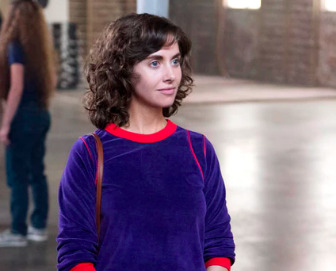
Ruth’s dominant function is introverted sensing; her first reaction to a new situation is to try to relate it back to her knowledge base in the tropes and traditions of theater. In the first season, she struggles to create a character for herself, until Zoya comes to her in a flash at the patio store (inferior Ne). She then begins to really build that character through Si: she needs direct, tangible experience to flesh out Zoya (which she gets when she crashes the Russian Jewish family’s party to practice her accent). She is concerned with getting the details of her performance just right, and she constantly tries to fit G.L.O.W. into a larger narrative of theatrical themes that she has studied so intensely for several years. She isn’t a natural risk taker, but her partnership with Sam Sylvia (an ENTP) inspires her to tap into her lower functions and try out new ideas and experiences.
Ruth is a people-pleaser and often compares herself to others; she tells Sam, “I get very anxious when I feel like I’m behind in a group setting.” She views G.L.O.W. as a team and invests a lot into building camaraderie with her costars, especially after her friendship with Debbie implodes. In the first season, she has a very hard time asserting herself because of her guilt over that betrayal.
Debbie Eagan: ESTJ
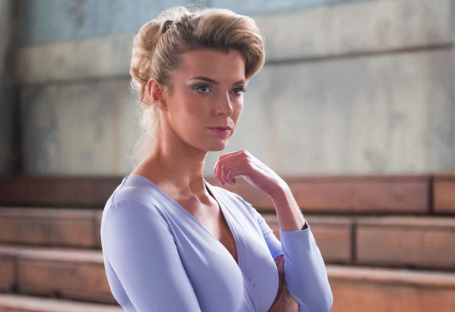
Debbie is dramatic, and she’s often manipulative, but that doesn’t make her a feeling type; in emotional situations, she’s often at a loss of how to react appropriately, and she doesn’t have a clear understanding or handle on her own emotions. She has a victim complex in relationship to Ruth (unhealthy inferior Fi), even though the two of them have wounded each other a lot over the years. She’s manipulative because she’s spent a lot of time painstakingly studying emotions (Si) and working that into her logical framework; she knows the game and how to play it (Te), which is why she’s been very successful in her career. She can easily switch off her emotions to focus on the task at hand.
She’s an unhealthy Te user, though, which leads her to be excessively harsh, most notably when Ruth finally stands up for herself and fends off a sleazy TV executive in season two. Debbie is not sympathetic to Ruth’s feelings at all. She flat out says that those are the rules of being a woman in show business. She chastises Ruth for being selfish. In Debbie’s mind, Ruth acted illogically, and what’s worse, she presumed that the rules didn’t apply to her, that she was above having to deal with these situations.
Debbie absolutely expects other people to put their own feelings aside to get the job done because that’s what she’s done for so long. Her unhealthy introverted sensing has led her to make a lot of sacrifices without really considering alternatives; up until G.L.O.W., Debbie has pretty much played by the rules and maintained the status quo, even though, as Ruth observes, she’s been miserable within it for a long time. She gave up her acting career to care for her son, but also to coddle Mark’s ego over having a wife who’s more ambitious and successful than he is. As much as Debbie lays the guilt trip on others (er, Ruth), she’s also extremely susceptible to guilt herself (unhealthy Si), which is why she would have stayed in her marriage forever.
Debbie tends to take everything a bit too far; her tertiary Ne comes out in those moments of being especially over-the-top. In healthier outlets, she brainstorms story lines and expands on the soap opera tropes that she knows well (Si-Ne). But Ne also rears its head in times of emotional duress. When Mark has his secretary call to ask her the brand of their bed, Debbie loses it; she impulsively decides to sell the bed, then everything in the house, eventually marking it all down to $5 because she can’t deal with consistent or reasonable pricing; she just knows that she wants it all gone because the memories are too painful (Si), so she says “screw it, this doesn’t make sense, nothing is going according to my plans anymore, so burn it all down” (Te-Ne). She’s constantly fending off the threat of her own emotions, too afraid to go into a vulnerable place because when she does, she slips into self-loathing and has a hard time yanking herself out of her emotional spiral. It’s a lot easier for her to repress her feelings – until they get too big and messy to handle.
Sam Sylvia: ENTP

Sam’s primary cognitive function is extraverted intuition; he deals in possibilities. We see this in action as he’s determining the cast in season one. He talks through all of his reactions to them out loud, with little regard to their feelings (low Fe) and he launches into ideas of possible characters; he takes an idea and runs with it, expanding it, complicating it (Ti working with Ne), mapping out a larger story arc that goes way beyond wrestling matches. That outrageous sci-fi plot indicates that he’s decided to take this potentially hokey wrestling show and transform it into something that fits into his autership, his internal framework that guides his film-making (Ti). He isn’t the best at follow-through, however (which is why he relies so much on Cherry and Ruth). This scattered tendency intensifies in season two, when he’s in an Ne-Fe loop over the threat of losing creative control. He becomes manipulative and petty as he fails to handle this stress. He starts lashing out emotionally, regarding Ruth with suspicion and publicly castigating her.
His inferior introverted sensing isn’t all that noticeable, except in his awkward attempt at parenting Justine involves giving her old photo albums… of relatives she’s never met and doesn’t even know how she’s related to them (again, low Fe). His idea is that Justine will want to know her family’s history and that the photos are a way to communicate that with her and establish a familial connection; he just has a very poor grasp of Si (and Fe) and doesn’t bother with the details.
Bash Howard: ENFP
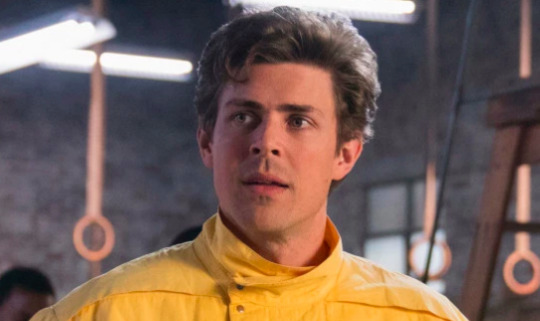
Bash is full of big ideas. His dominant function is extraverted intuition; he loves exploring possibilities, delighting in helping the GLOW girls create characters and explore costume options at the show’s inception, and as the show progresses, he thrives in the brainstorming and story boarding sessions. He believes in his vision of GLOW and is optimistic about his ability to bring that vision to life. He’s not the best with details (inferior Si); in season two, when a TV executive calls him and wants to come to the finale’s taping, he neglects to get the guy’s name and he turns to Debbie to figure it out.
His auxiliary introverted feeling is most obviously expressed through his eccentricity, which places him pretty far outside the kind of life his rich mother Birdie expects of him. Even though he knows this (and Birdie is not subtle, frequently withholding his allowance when she wants to express her disapproval of his choices), he doesn’t compromise; Bash is going to live his life on his own terms and adhere to his own set of values. This is a big part of why the girls open up to him so quickly; he is completely earnest and genuine, both in his love of wrestling and the way he values their individual potential, talents and needs.
That doesn’t mean that he’s fully developed his Fi, especially when it comes to his own emotional needs. In the finale of season 2, he tells Rhonda that he doesn’t fully process his emotions, but as we’ve seen from earlier episodes, this really isn’t the case. Bash has a strong understanding of his emotions, but he is reluctant to express them openly. He keeps his depth of feeling to himself, heartbreakingly so in the later episodes of the second season. This tendency to repress and internalize his emotions is compounded by the terrible reality of the closet and internalized homophobia in the 80s; Bash is either bi or gay, and he’s at least emotionally involved with Florian, his butler/best friend. When Bash gets the phone call that Florian has died (it’s heavily implied that he had AIDS), he walks away from Debbie at the bar, chokes back tears, hangs up the phone and doesn’t tell a soul. He buries all of those feelings deep inside and suffers alone. Instead, he acts with self-sacrificing chivalry towards Rhonda, which is baffling on the surface (”Rhonda just married a millionaire with no pre-nup!”), but this is his mode of coping with his complicated feelings about Florian; it’s a bruise too painful to touch or admit, so he chooses to hide further behind a mask of a heterosexual marriage.
Sheila the She-Wolf: ISFP
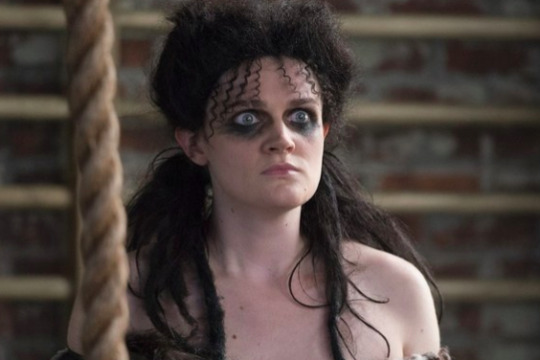
Sheila is living life as her most authentic self (dominant Fi). In the first season, when her roommate Ruth is struggling to create a character, Ruth praises her Method acting. Sheila swiftly corrects her: this is not a costume and it is not an act. Later on, she explains that she feels that, spiritually, she is a wolf. She doesn’t offer any further explanation of this spiritual connection to wolves; it’s enough that she knows it and that this is her truth.
Although she’s very aware of how unconventional she is, Sheila doesn’t care too much about how other people react to her appearance because authenticity is much more important to her; she has a strong sense of self and she’s compelled to express it physically, through her clothes and makeup. That indicates a strong use of her two dominant functions, introverted feeling and extraverted sensing.
Sheila has a lot of surprising talents and abilities. In season one, she reveals her ability to play piano, though, hilariously, she only knows the theme from Exodus. In season 2, she saves the day for Ruth and Debbie by typing their PSA with astonishing speed and accuracy. These unexpected talents aren’t necessarily related to MBTI, but her lack of explanation is; she simply springs into action whenever one of her skills is needed (Se), without feeling the need to narrativize how or why she knows these things.
In season 2, we see some of her inferior Te come out under stressful conditions, when Sam projects his own anxiety about losing control of the show onto all of the wrestlers and makes them compete against each other for a spot on the show each week. Sheila picks up on this quickly and adjusts to these new circumstances (Se-Ni) in order to protect herself. For example, while everyone is practicing for the week’s audition, Sheila pounces on Rhonda and covers her mouth to prevent her from revealing anything about their plan; this seems out of character for Sheila, but she’s read the situation and becomes suspicious of others (Ni-Te). She becomes competitive to preserve something she really cares about (Fi-Te); of all the wrestlers, Sheila is probably the one who truly needs this the most, because where else will she be actively encouraged to be a wolf? Sheila knows this and she’s going to fight and scrap and do whatever it takes to ensure that she can stay, even if that means somewhat harsh treatment of her teammates.
Carmen Wade: ISFJ
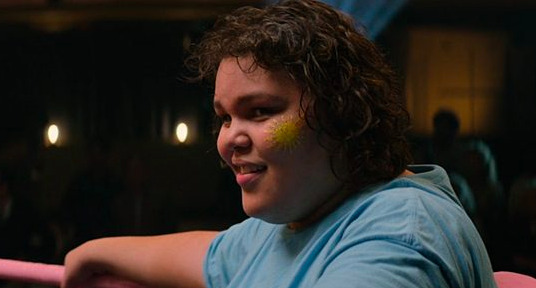
Carmen is warm and caring, and she shares her encyclopedic knowledge of wrestling (Si) to help her teammates develop their characters and more fully understand what they’re doing and why. In season one, Carmen is hesitant to upset her family’s expectations and demands on her, so she keeps her wrestling a secret. This is because she knows how they’ll react (Fe), that they view wrestling as a male-only activity, but also because she’s so passionate about wrestling and is unwilling to compromise on that just because her family disapproves. Wrestling is an integral part of Carmen’s sense of self; she’s passionate about the sport and its history, including her family’s history in wrestling, even if they don’t want to see it that way at first (one of my favorite moments is when her dad shows up to cheer her on and leads the crowd in chanting “Machu Picchu!”). Attaining that parental approval is important to Carmen, even though she’s willing to pursue her goals without it.
Carmen is hard-working and devoted to her area of expertise, and she uses that knowledge as a means of helping others. She organizes a team outing to watch a wrestling match so the others get that first-hand experience of what it means and what it’s about (Si again). In season 2, she is so supportive that she stretches herself too thin (in classic ISFJ fashion); she is so busy helping the others improve their wrestling moves that she doesn’t fully develop her own storyline for the week. She also shows difficulty in pivoting and improvising in the moment (inferior Ne) when Sam cuts their audition short.
26 notes
·
View notes